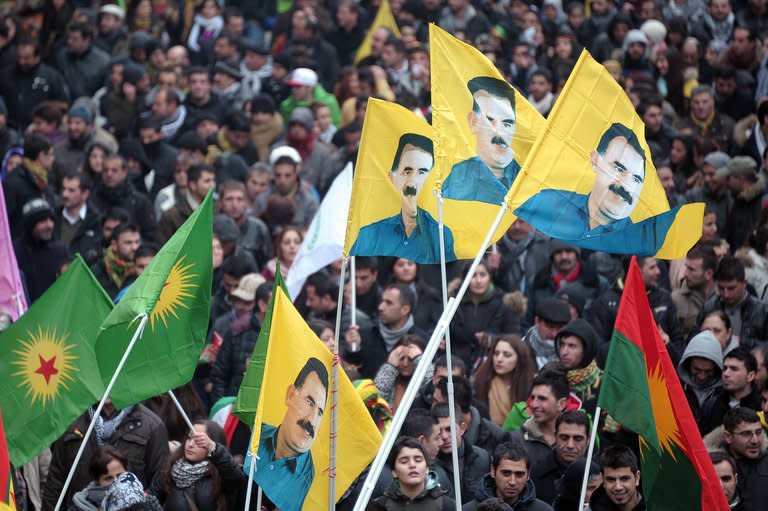Jailed PKK chief Ocalan 'to declare ceasefire on March 21'

The jailed leader of Kurdish rebels is set to call for a long-sought ceasefire on March 21, the day of the Kurdish new year, as part of a renewed push for peace with Ankara, officials said on Wednesday. "(The PKK) will declare at the very least a ceasefire by Newroz (March 21) and lay down arms by July-August, after which departure from the country will be discussed," Deputy Prime Minister Bulent Arinc said in an interview on NTV news, relaying written instructions given by Abdullah Ocalan to the Kurdish rebel movement. Arinc was quoting from a 20-page letter penned by the rebel chief outlining his views on a possible solution for the nearly three-decade-long conflict between the outlawed Kurdistan Workers' Party (PKK) and Turkish security forces that has cost 45,000 lives, mostly Kurdish. Led by Ocalan, the separatist PKK is branded a terrorist group by Turkey and its Western allies. In December, Turkey's secret services resumed negotiations with Ocalan with the ultimate aim of ending the PKK's fight for autonomy. Ocalan's letter was addressed to the PKK command in the Qandil mountains in northern Iraq, its European network and the pro-Kurdish Peace and Democracy Party (BDP), according to BDP lawmaker Nazmi Gur. Gur told AFP that Ocalan was proposing a "draft solution" in the letter and there would be more discussion and feedback before reaching a final decision. "We, all components of the Kurdish movement, will be standing behind that final decision Ocalan will give on that day," Gur said, referring to March 21. Both sides in the conflict have set out conditions they say would signal good faith and commitment to long-lasting peace. The Kurdish movement is asking for the release of hundreds, possibly thousands, of Kurdish activists and politicians kept in detention on charges of links to the PKK. Ankara in return insists "terrorists" need to withdraw from Turkish territory before the peace process can effectively begin, and has promised not to attack rebels wishing to leave the country. Ocalan is currently serving a life sentence on an island prison off Istanbul where visitors are rarely allowed and only under the surveillance of Turkish agents. Last week, however, three Kurdish lawmakers went to see him as part of the rekindled peace efforts. It was the second such visit since the negotiations resumed and considered a sign that the process was advancing. But observers caution that Ocalan's influence on the Qandil and Europe wings might have waned during his years in prison, although he still enjoys strong support from Turkey's Kurds, who make up roughly 20 percent of the country's 75-million population. "We are pursuing rational politics," Arinc said about the nascent peace talks. "If we succeed, Turkey will wake up from a 30 to 40 year old nightmare. But if not, Turkey will feel deeper pain, the burn marks of terrorism."


